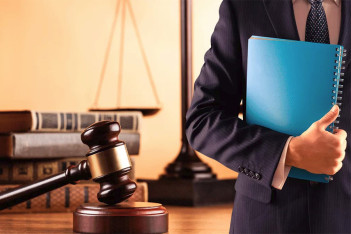Closing the criminal case
A criminal case is always a serious test for any person, regardless of their status, profession or past merits. Even in the absence of guilt, participation in a pre-trial investigation itself can affect one's reputation, psychological state, career and family. However, Ukrainian legislation provides clear grounds and procedures for closing criminal proceedings. Competent legal support is the key to protecting yourself legally and stopping the persecution as soon as possible.
Legal stages of closing criminal proceedings
Closing a criminal case does not happen automatically - it is a complex process that requires a professional approach, detailed analysis of the case materials and knowledge of the practice of the investigation and the court. Here are the main stages that the lawyer goes through together with the client:
- Studying the criminal proceedings materials: At the first stage, the lawyer studies the ERDR, the investigator's request, interrogation protocols, examination results, rulings and other documents that may affect the fate of the case. The purpose of this stage is to identify procedural violations, the absence of elements or events of a crime, the illegality of evidence, etc.
- Legal qualification of the situation and assessment of the grounds for closing the case: The lawyer determines whether there are sufficient grounds to initiate the closure of the proceedings. This may be the absence of elements of a crime, failure to prove guilt, the expiration of the terms for bringing to justice, the absence of an event of a crime, or other grounds provided for by law.
- Preparation of statements, petitions, and accompanying documents: A competent justification for the closure of the proceedings is formed: a petition to the investigator or prosecutor is prepared, statements to the court as part of appealing the inaction of the investigative bodies, written evidence refuting the accusation.
- Interaction with law enforcement agencies and participation in investigative actions: The specialist enters into official communication with the prosecutor, investigator, and sometimes with the leadership of the relevant body. The lawyer can also participate in interrogations, influence the course of the investigation, ensuring that there is no falsification or pressure.
- Achieving the result - obtaining a resolution to close the proceedings: As a result, the lawyer achieves the official closure of the case with the entry of the relevant resolution in the ERDR. The client receives a document confirming the termination of the proceedings and the termination of any restrictions or suspicions.
Thus, legal support is not only about submitting documents. It is active legal work at each stage in order to protect the client.
Conditions for providing legal assistance in criminal proceedings
In order to effectively implement the defense and achieve the closure of the criminal case, the party seeking legal assistance must fulfill a number of conditions:
- Complete trust and provision of reliable information: To form the right defense strategy, the lawyer needs to know the full picture - with all the details, even inconvenient or potentially compromising. All information is protected by attorney-client privilege.
- Provision of documents and access to the materials of the proceedings: The sooner the lawyer receives the resolution on the initiation of proceedings, the decision on a preventive measure, interrogation protocols, expert opinions - the sooner he will be able to act in favor of the client.
- Written power of attorney or representation agreement: This is the legal basis for the lawyer's participation in the proceedings: conducting negotiations, filing complaints, participating in investigative actions and defending in court. Without it, the lawyer is limited in his actions.
- The client's willingness to participate in the process (if necessary): Closing the proceedings sometimes requires the client's personal presence during investigative actions, undergoing a psychophysiological examination or providing personal explanations.
- Operational communication: Time is a critical factor in the criminal process. It is important that the client answers calls, quickly agrees on a strategy and makes decisions within the limits of the lawyer's recommendations.
Compliance with these conditions allows the lawyer to quickly and effectively implement the client's defense and achieve the official closure of the criminal case.
Advantages of contacting a lawyer during the process of closing a criminal case

Protection from procedural errors: The lawyer will not allow steps that may be harmful in the future - for example, providing testimony that contradicts the interests of the client.

Control over the actions of law enforcement officers: The specialist protects against illegal pressure, falsifications and violations of rights during the investigation.

Maximum acceleration of the result: The specialist knows how to optimize the process and achieve the closure of the case without delays.
Common questions about closing criminal proceedings
Question
When is a criminal case closed?
Answer
A criminal case is closed when there is no element of a crime, the statute of limitations has expired, there is reconciliation of the parties or a corresponding decision has been made by the court or investigator. The grounds are determined by law.
Question
When can the court close criminal proceedings?
Answer
The court may close criminal proceedings if there are no elements or events of the crime, the statute of limitations has expired, the parties have reconciled, the accused has died, or there are other grounds provided for by the Criminal Procedure Code of Ukraine.
Question
How to find out if criminal proceedings have been closed?
Answer
To find out if criminal proceedings have been closed, you can contact the pre-trial investigation body, prosecutor, or court with a request. You can also check the information through a lawyer or get an answer from the ERDR if you have access.
What does the cost of legal assistance during the procedure for closing a criminal case depend on?
The price of legal support in a case to close criminal proceedings depends on many factors. In particular: the complexity of the case, the number of episodes, the participation of several parties, the volume of documents, the degree of publicity, the stage of the criminal process (pre-trial investigation, trial phase, etc.), the need for emergency measures (complaints, petitions, appeals), and the urgency of implementation. Each case is individual, so the final cost is determined after the initial consultation.
ConclusionCriminal proceedings are not only about accusations. They are also about protection, about a person's right to justice and to have their position heard. Closing the case is a return to normal life, but achieving this without an experienced lawyer is almost impossible. A professional lawyer provides legal support, peace of mind, a safe strategy and confidence in the outcome. In such situations, it is better to act decisively and according to the law - together with a lawyer.








































